in defence of Arab rage and the western gaze (part 1)
on the most controversial identity you know.
Hey reader! By reading this you've completed the first step in helping yourself de-stigmatise the Arab / Muslim world from a brain full of mainstream media. And for that, I really appreciate you. Being Lebanese means sometimes I cannot help, but approach heavier topics and if it were up to me politics wouldn't be engraved in my DNA—because I have been scrutinised for that by practically anyone who wasn't Arab. Years of geopolitical turmoil that I, my people, and our ancestors went through, means the whole of the Middle East is injected with a dose of politics, rage, and frustration from being misunderstood into our identity. Why? Because we yearn for a time where we are no longer a taboo to be discussed and a controversy to take sides over at another ethnicity's dinner table. Fighting for our lives to be seen, to be heard, and to be understood is still an ongoing battle, but with a platform like Substack, we can finally take control of the narrative. And I couldn't have had this post out without the little Arab community I have found here, who pushed me to do it, when it was sat in my drafts for ages. So, thank you.
This article is dedicated to my grandparents, my first supporters, two people who have witnessed the Middle East in its prime and at its lowest, yet wake up every day with pride in their identity. Despite holding another nationality, they have remained loyal to their people, steadfast through wars, economic turmoil, and political upheaval. In a world where media and history are often uncertain, my grandparents stand as proof of unwavering righteousness, morale, and factual history.
Edward Said’s Orientalism (1978) introduced the idea that the West has historically constructed a distorted, simplified image of the "Orient"—which includes Arab societies—through literature, art, and media. These portrayals often reduced Arabs to either violent fanatics, mysterious desert dwellers, or exoticised, passive figures.
This historical framework helps explain why contemporary media still relies on these stereotypes. Whether it’s Hollywood movies portraying Arabs as terrorists or travel ads depicting the Middle East as an ancient, mystical land, these images are not new. They stem from a colonial-era narrative where the West positioned itself as superior, rational, and civilised, while the East was depicted as dangerous, backwards, or sensual—freezing the region in time, rarely shown as modern, dynamic, or innovative. Arab women are either oppressed victims needing rescue or eroticised belly dancers. And Islam is portrayed primarily as a source of violence or oppression.
But let's rewind a minute.
My mum birthed a girl with blue eyes, an eye colour that had skipped two generations from both my parents’ side and made their way to me. I also had light skin and chocolate coloured hair. Now, I want you to pause for a minute and picture me—removing this article's context. Where do you think I'm from? I bet you imagined someone from the West. But I am from the Near East, بِلَاد الشَّام bilad al sham (or Levant), specifically Lebanon.
I also have bushy brows, a nose with a slight dorsal hump, and hair, everywhere. But as face-altering procedures became more common, my features grew more ambiguous, less distinctly Lebanese. People have mistaken me for Italian, Greek, Georgian, French, Turkish—you name it. It was always a Mediterranean or North West Asian country, but never an East Mediterranean country. In fact, admitting that I’m Lebanese often invites surprised reactions.
"But you’re white."
"Your eyes are blue—are you sure you don’t have European genes?"
"But you don’t look Muslim." I never said I was.
And if I’m being honest, my younger self might have secretly relished those assumptions, using them to distance myself from other Arabs—especially Muslims.
Growing up, I adored Arabic music. We had icons like Fairuz—who some of you may already know—but also Haifa Wehbe, Amr Diab, and Tamer Hosny. I knew their songs by heart, belting them out during car rides as my parents played them on the stereo. At home, my dad would stretch out on the couch watching Egyptian cinema, while my mom was glued to a Turkish series. I loved it all; it was the backdrop of my childhood.
And then the 2006 Israel-Hezbollah conflict happened. I remember the days leading up to it. My parents were watching the news in the early morning before school drop off till the late night. I remember them arguing on whether they should take my sister and I to school that day, and some days we missed, whilst others were attended. And then the assault took place.
Western media framed this as Israel defending itself against "terrorists", whilst Lebanese civilian casualties and destruction were underreported. The term "collateral damage" was frequently used to minimise Lebanese suffering. I spent days sleeping in the corridor of my home, where no windows could be found. I remember my dad being stuck at work and a man banging at our door in the middle of the night. My mum, on her nerves, screaming from the other side. That summer, my parents stayed in Beirut and sent us to our grandparents’ mountain house.
“Why are we here? When will we get to see mummy and daddy?” We'd ask our grandma.
“!الحرب ,الحرب” “The war, the war!” She would reply. But my sister, my brother, and I did not know what that meant. That day we gave the word meaning.
I grew a little bit more and I discovered Disney Channel. And maybe that was the pivotal turning point. Hannah Montana, The Suite Life of Zack & Cody—I was hooked. Their slang became mine. Their music became mine. My English improved, while my Arabic withered. Suddenly, singing Arabic songs felt embarrassing. Watching an Arabic movie at the cinema? Unthinkable, “It just wasn't cool enough” I'd think. I stopped trying in Arabic class and let English take over as my mother tongue. After watching one too many Western family movies, Christmas started to seem more appealing than Ramadan, and little by little, I began to resent Islam.
I remember the first time I watched Disney’s Aladdin (1992). I recognised myself in that movie immediately. It would only take me years to realise that this movie was only an early example of Orientalism that would be engraved in my brain.
Though it was inspired by the Arabian Nights stories, the film blends various Middle Eastern and South Asian influences into an ahistorical, fictionalised land that reinforces Western fantasies of the "mystical Orient” and erases real Arab identity. Even the name Agrabah itself is a mishmash that doesn’t belong to any real place. Setting as an exotic, barbaric land, the kingdom of Agrabah is depicted as a violent, lawless place where violence is normalised. The opening song, Arabian Nights, originally included the lyrics:
"Oh, I come from a land, from a faraway place / Where the caravan camels roam / Where they cut off your ear if they don’t like your face / It’s barbaric, but hey, it’s home."
Aladdin and Jasmine are given more Westernised features and accents, while Jafar, a visibly more Arabic name, and the other villains have exaggerated, hook-nosed features and thick, accented voices. This follows the long-standing Hollywood trope where villains are made to look more "ethnic" and sinister.
And I was mortified of Jafar as a kid. From that day forward, I would have been mortified of anything that resembles him.
I remember Britney Spears’ prime era, I was maybe around 5. She was this iconic pop star—her music was everywhere. Slave 4 U. Another Orientalist example from my childhood. Spears incorporated belly dancing and Middle Eastern-inspired costumes in ways that often reduce the culture to hypersexualisated, exotic performances without real engagement with its origins. Spears performed the song live, dancing with a python—where snake charming originates from Egypt and Morrocco. She did an interview 15 years later and said the only thing she regrets about this performance is the python around her neck.

Another example that comes to mind is Christina Aguilera’s Genie in a Bottle. As a child, just hearing the title, I instinctively associated it with my own culture—unaware of the song’s actual lyrics, the video’s imagery, or the fact that the singer was a white American pop star. The choreography features slow, sensual body rolls, hip sways, and arm extensions, mimicking elements of belly dance but in a highly stylised, Westernised way. The music video is bathed in warm, golden lighting, set against a beach and sunset backdrop, evoking the stereotypical “exotic East”—a fantasy space often tied to Middle Eastern deserts and mysticism. Even Aguilera’s outfit, while not as blatantly appropriative as Britney Spears', borrows elements reminiscent of MENA aesthetics.
Now, genies, or djinn, originate from pre-Islamic and Islamic mythology, where they are supernatural beings associated with shapeshifting, possession, and madness. Yet, Western reinterpretations stripped away this complexity, reducing them to wish-granting, lamp-dwelling creatures—yes, think Aladdin! Genie in a Bottle plays into this Orientalist fantasy, recasting the djinn as a submissive, mystical “harem girl” trapped in servitude, waiting to be released—a commodified version of a figure with deep cultural and religious significance. Similarly to Spears’ Slave 4 U, both of these songs are hypersexualised and frame women in a submissive tone. I grew up with both of these songs.
I reached the age where news was irrelevant to me, but I began picking up on it. Orientalism in the news is the critical acclaim that shaped the Western Gaze, forming the all-too-known “Arab” identity within the subjective western lens.
It is a lens that distorts and judges Eastern identity, culture, and politics through Western ideals, reducing Arabs to simplistic binaries and forcing them to navigate a space between visibility and acceptability, while shaping self-perception, internalised Islamophobia, and a disconnect from their heritage.
In 2011, the Arab Spring happened. Western media reduced diverse, indigenous movements to a single narrative of Western-style liberal democracy. The uprisings in Tunisia and Egypt were glorified, while Bahrain's protests were ignored due to U.S. alliances with the Gulf states. Libya and Syria saw more complex narratives as interventions became entangled with Western interests. Rather than recognising the rich historical, cultural, and political complexities driving these revolutions, many Western media outlets framed them as simplistic quests to "catch up" to Western norms, or a social media revolution, or a youth rebellion—depicting Arab societies as inherently chaotic and in need of external, Western intervention to achieve stability and modernity.
I turned 12 and ISIS was born. The news was relentless. I was too young to fully grasp it, but I knew they were the bad guys. The media coverage focused on ISIS as an existential threat, often reducing complex regional dynamics to a simplistic “good vs. evil” narrative. Civilian casualties from U.S.-led coalition bombings were underreported. Week after week, the headlines grouped Arabs and painted us as villains. I consumed it all, reading every comment section.
This was another pivotal moment in forming my internalised hate. Cue in the Western Gaze, a term I'm taking the lead in coining. While Orientalism is the broader, historically entrenched system of knowledge and power that has systematically misrepresented and marginalised Eastern societies to reinforce Western superiority, the Western Gaze refers to the subjective, often biased perspective through which the West views other cultures.
And then at 13, I created my Instagram account and I became connected to the world and fast. It was the first I’ve heard of Egypt’s military coup, Mohamed Morsi, Egypt’s first democratically elected president, was ousted by the military, Western media largely avoided calling it a "coup" to maintain relations with Egypt’s new military government.
I began reading and I fell down a rabbit hole. That’s when I came across 9/11 and who was blamed for it. Muslims. Just like ISIS. Now, let's not misunderstand each other—what happened on 9/11 is an act of terrorism and is evil—but, western media became instrumental in shaping the "War on Terror" narrative, repeatedly portraying Arabs and Muslims as either terrorists or helpless victims in need of Western intervention. News outlets disproportionately focused on violent imagery, reinforcing stereotypes of the Middle East as a region defined by chaos and extremism. This reductionist view erased the complexities of local politics, culture, and resistance, instead justifying military action under the guise of “liberation.” Hollywood and television further amplified these tropes, cementing the image of the “dangerous Arab” in the Western imagination. Two years later, U.S. invades Iraq justified by claims of Saddam Hussein possessing weapons of mass destruction, which were never found. Western media largely parroted government narratives, while Iraqi suffering was often downplayed. The war destabilised the region, creating the conditions for future extremist movements. A study by Air Force Magazine concluded 29,199 bombs, rockets, and missiles of all varieties were dropped on Iraq. U.S. also invaded Afghanistan to overthrow the Taliban and dismantle al-Qaeda following the 9/11 attacks. While the Taliban was quickly removed from power, the war led to prolonged conflict, civilian casualties, and mass displacement. Infrastructure was damaged, and ongoing violence and corruption hindered long-term stability. The war fuelled the opium trade, deepened economic struggles, and left many Afghans traumatised. After 20 years of conflict, the U.S. withdrew in 2021, with no reparations or strategy, and the Taliban regained control, reversing many social advancements.
Then 2014 changed everything. Mia Khalifa—A Lebanese American Christian released a porno in a Hijab—which sorry western feminists, us in the East are still not over this. The article below, written by
, does a good job at highlighting what Mia Khalifa helped shape, the sexualisation of Muslim women.What Mia Khalifa did— repurposing the hijab, a symbol of modesty in Islam, to explicit performances to fuel Western fantasies of the "exotic" and "forbidden." This portrayal aligns with the West's tendency to objectify and distort Eastern cultural symbols, reducing them to tools for voyeuristic entertainment while reinforcing stereotypes of the oppressed, submissive Muslim woman.
Now, a lot of people—specifically from the west?—have chosen to forgive her (why are people from the west even doing the forgiving her?). But, the fact is Mia Khalifa spent 10 years in Lebanon studying at a private school in Beirut—which is expensive. Could she really have thought that her actions, coming from a country steeped in religious and political tension, would be met with anything other than outrage? And she is still profiting off of her actions.
Her swimwear line, Sheytan—demon in Arabic —still capitalises on her past fame, with branding that often plays on her previous controversial image. This move highlights how her identity continues to be shaped by the West’s fascination with her "transgressive" past, even as she attempts to redefine herself. The swimwear brand simultaneously challenges and reinforces Western perceptions of her, blending empowerment with the commercialisation of her previous exploitation, all while maintaining a connection to her "othered" identity shaped by the West’s gaze. The Middle East is home to Abrahamic religions, where people there still hold religious values; I personally wonder if Khalifa's ridiculing of religion has anything to do with her internalised hate and need to please what the West describes as liberalism?
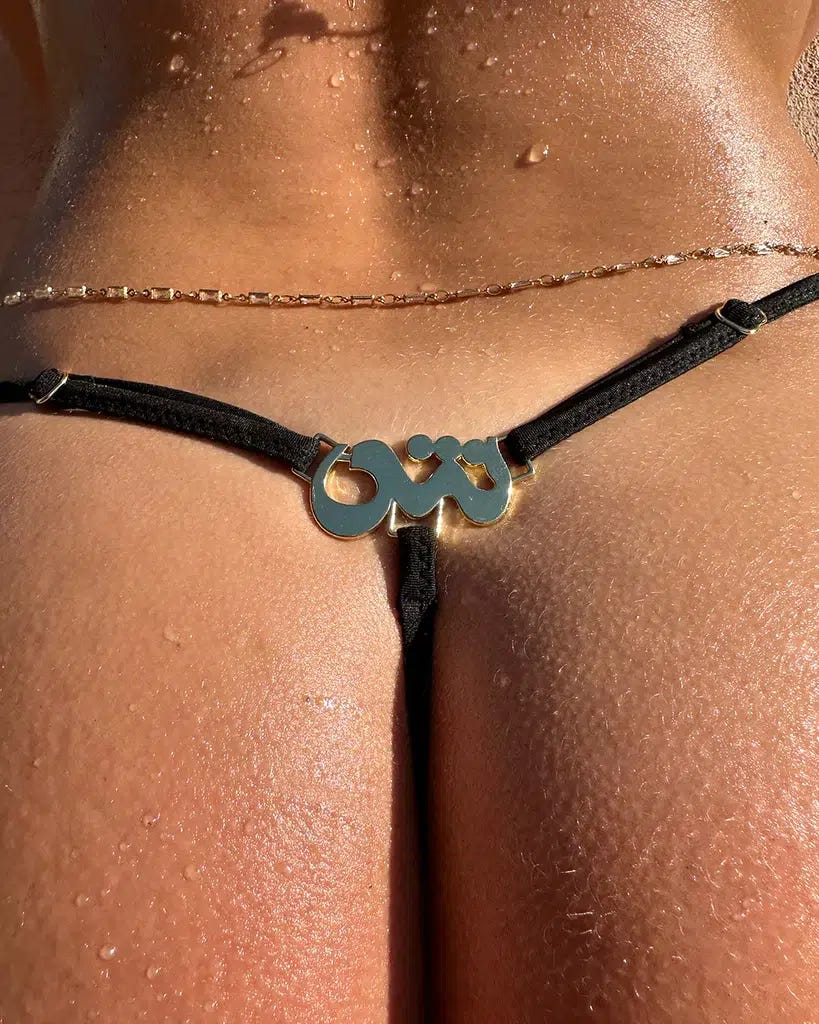
In 2015, US took ISIS as an excuse to invade Syria and oppose Russia, who funded Bashar al-Assad, the former president of Syria, creating the Syrian refugee crisis. Images like the body of Alan Kurdi, a drowned Syrian child, briefly humanised refugees in Western media. However, coverage often played into fear-mongering about migration, with phrases like “migrant crisis” rather than “refugee crisis”.
That same year, Kendall Jenner and Gigi Hadid (who get's a pass because she's part Palestinian and vocal about it) in the the Balmain x H&M campaign. Please, this is the only video I will request you to watch. The collection featured intricate embroidery and silhouettes reminiscent of traditional MENA garments, yet the campaign predominantly cast white models, reinforcing a pattern of Western fashion commodifying non-Western heritage without proper representation. A particularly contentious campaign video showed models performing a stylised, but robotic?, belly dance, further exoticising the designs through a hypersexualised lens. Additionally, a prop resembling a (bedazzled?) Quran-like book appeared in the background, which is blatantly a careless incorporation of religious symbolism. The campaign was widely criticised for reducing MENA culture to an aesthetic while excluding the people to whom it belongs.
Every US presidential election was a major event in every Arab household—all TVs were on till late hours of the night. I remember Obama’s campaign like it was yesterday. The more votes he received, the more worried my father became, and I couldn’t understand why. “But Obama is the good guy,” I insisted, only for my dad to shake his head in worry. Now, I think it's important to make it clear that no US president will ever be a “good guy” for the Middle East. Not taking sides doesn’t automatically make us allies with any faction. Instead, we’re forced to cheer for the candidate who promises to bomb us the least—a grim reality we all had to face.
“If we’re good people, why do they talk about us this way?”
A question I should have asked, but didn’t. Because by then, I had already been groomed by the Western media. It was all I knew.
The US dropped 26,171 bombs in 2016 alone, 3,000 more than the preceding year. And I had to hear time and time over how great of a man he was.
That same year western media played a reductionist role towards Yemen's hunger crisis by minimising its severity, framing it as a "proxy war" and downplaying the West’s direct involvement. Even as Yemen became the world’s worst humanitarian disaster, mainstream outlets prioritised geopolitical narratives over human suffering, normalising war crimes through vague terminology and selective reporting. The crisis was largely met with silence, misrepresentation, and strategic neglect to protect Western alliances.
Now, I don't know much about video games, but I do remember the boys in my class going to a gaming centre. I was 16 and I thought I was “different”, so I went there to see what's all about. And I saw battlegrounds. And they looked very Middle Eastern. When writing this article, it took a little research to find Assassin’s Creed (2007)
and Call of Duty: Modern Warfare—specifically, when they added Farah Karim, a “battle-scarred warrior who has been fighting for survival since childhood." There is something deeply problematic about her origin story—found in rubble wearing a hijab and going after a Russian soldier. Middle Eastern grief was used to further spread American propaganda instead of bringing to life the real perpetrator, Israel and addressing a serious issue. This creates a complete mockery of what we go through.
Around the same time, I was an active Tumblr user—the most liberal social media at the time. There, I came across a post that spoke against the “Punish A Muslim Day”.
Whilst I felt saddened and worried for the innocent people in the West, I didn't understand the hatred. I was so young and surrounded by my people, I just didn't understand why us? Why us? Why us? What did I do?
And yet, my young mind was overwhelmed by Western propaganda, and I didn’t yet grasp the importance of independent research.
So, I distanced myself. I didn’t want to be lumped in with the "radical Muslims" or the "barbaric Arabs." I wanted to be seen as different. Better.
I started hating Lebanese food, couldn't be caught in a Lebanese restaurant, and I thought Islam stood for the complete opposite of liberation. When my parents encouraged me to learn about the religion, I snapped back with a list of propaganda and a closed mind. I thought I was the enlightened one and they would never understand. I was an edgy teenager who had adopted Western values and rejected anything that wasn’t— that included my culture, my religion, and inherently, myself.
I graduated high school in Lebanon and moved to the West, carrying that mindset with me—unaware that this move would dismantle everything I thought I knew.
At 17, I settled into my new life abroad. A year later, my sister followed. She had blonde hair, brown eyes, thin brows, and thin lips. Our parents never warned us about potential hate crimes or aggression. We were ethnically ambiguous and fluent in English. Who would ever know? It was easy to blend in.
Then my brother left Lebanon for the U.S.
Bushy brows. Tanner skin. Dark curly hair. And a name. Mohamad.
Suddenly, my parents’ stomachs twisted with worry. What would happen to him? What would he experience? We sat together as a family, joking about alternative names.
"Michael? Mike for short?" someone suggested.
I threw in “Oliver,” which no one liked.
That's when I knew it was no longer a joke, rather survival.
Thank you so much for reading the first part of a short series Orientalism on the news and the Western Gaze in my life. Please find some links to donate below and I hope to see you in part 2 where I uncover other dichotomies that this gaze has snowballed into.
Lebanon: Lebanese Red Cross
Palestine: Ghassan Abu Sittah
Syria: UNHCR
Iraq: Save the Children
Afghanistan: World Food Program
Sudan: UNHCR
Yemen: Crisis Relief
2 Seconds of Housekeeping!
Cosmopolitcs is an independent column created by Serene Hassouna, and it thrives thanks to the support of its readers. If you’d like to help sustain the column, you can contribute a one-time or monthly pledge via Buy Me A Coffee or directly on Substack, with support starting at just £1. If you enjoyed this article, please consider subscribing for more musings on life, love, and friendships that can break your heart more than any man ever could.


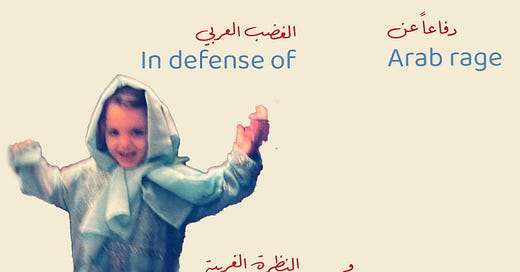



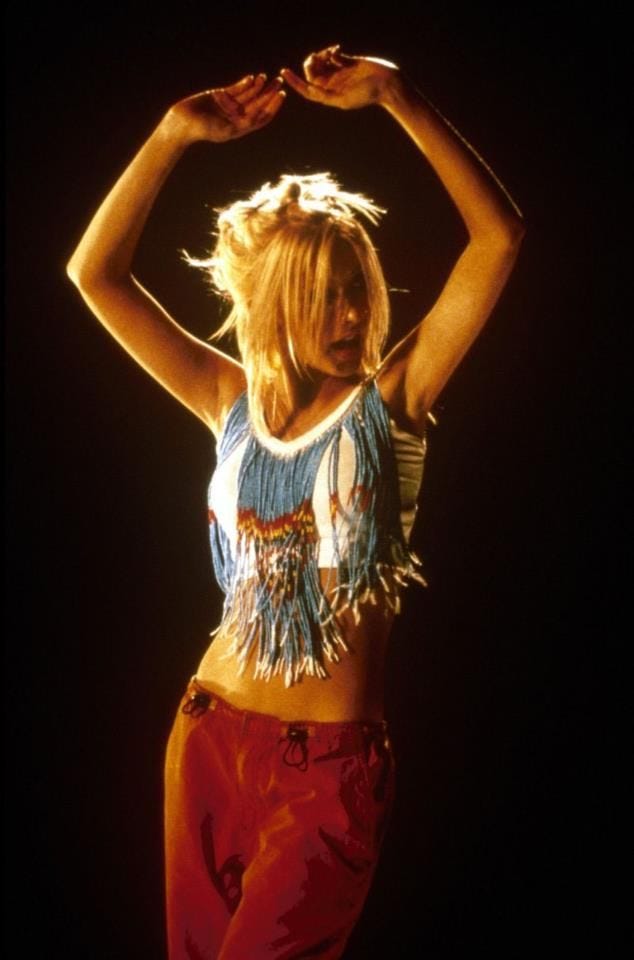

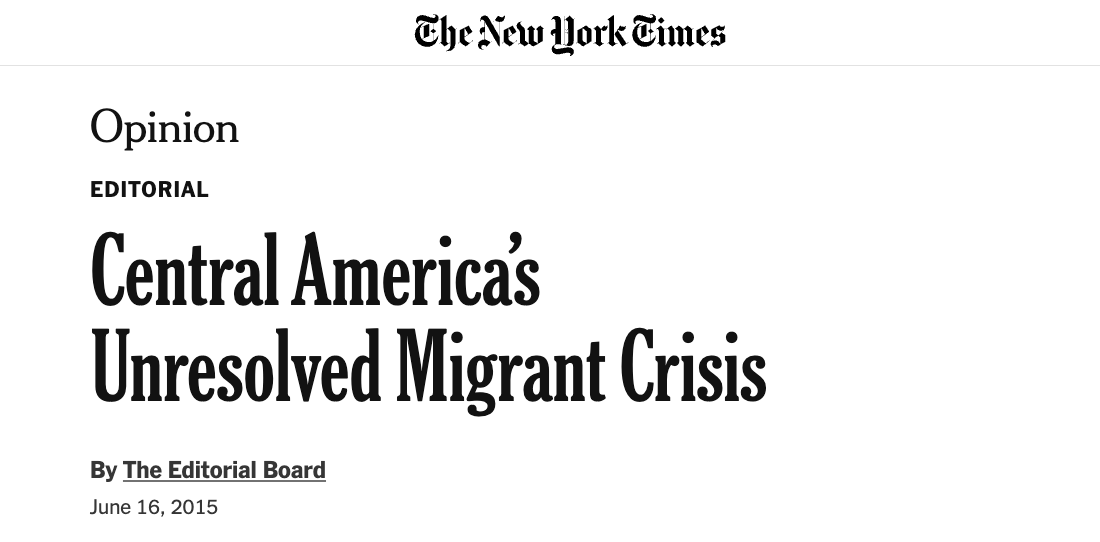
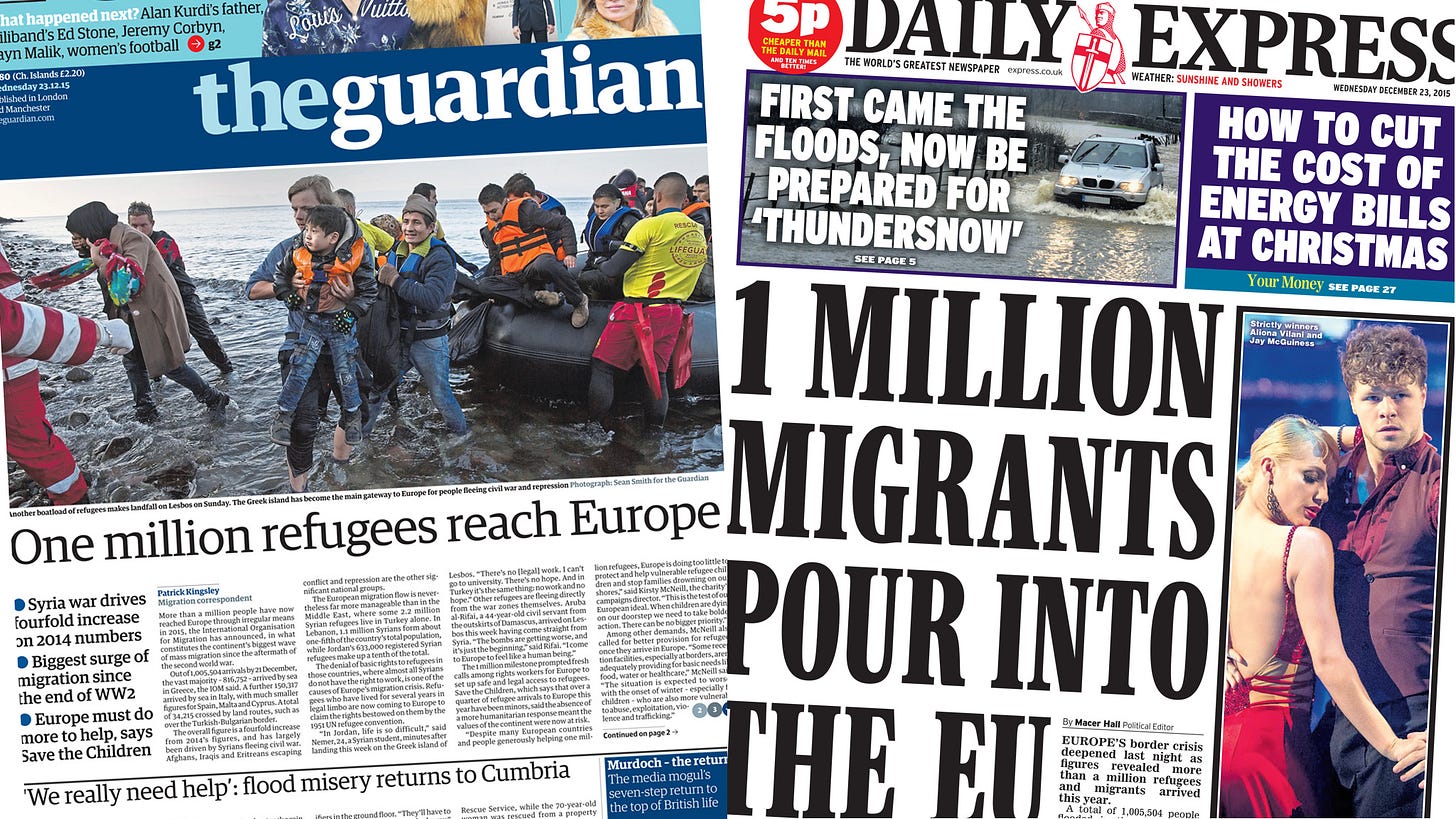
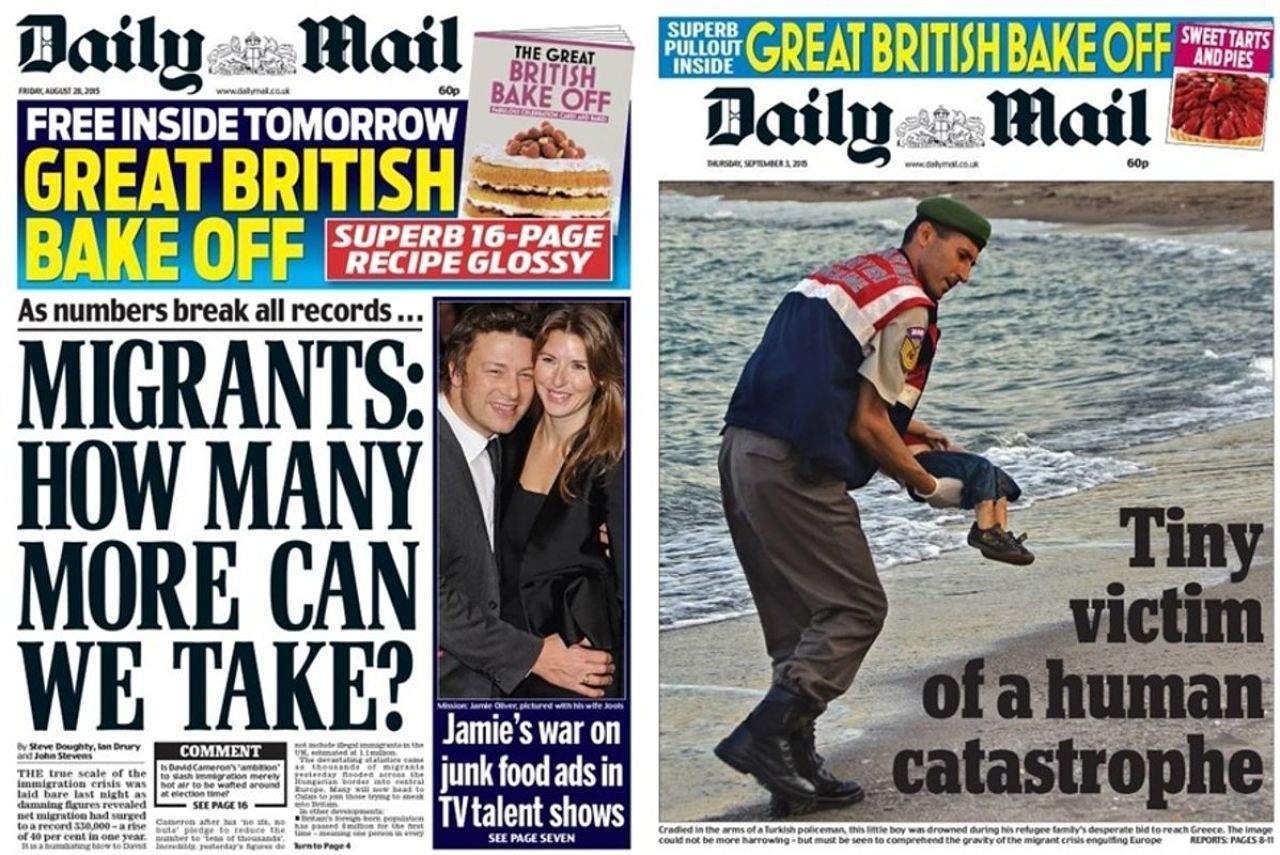
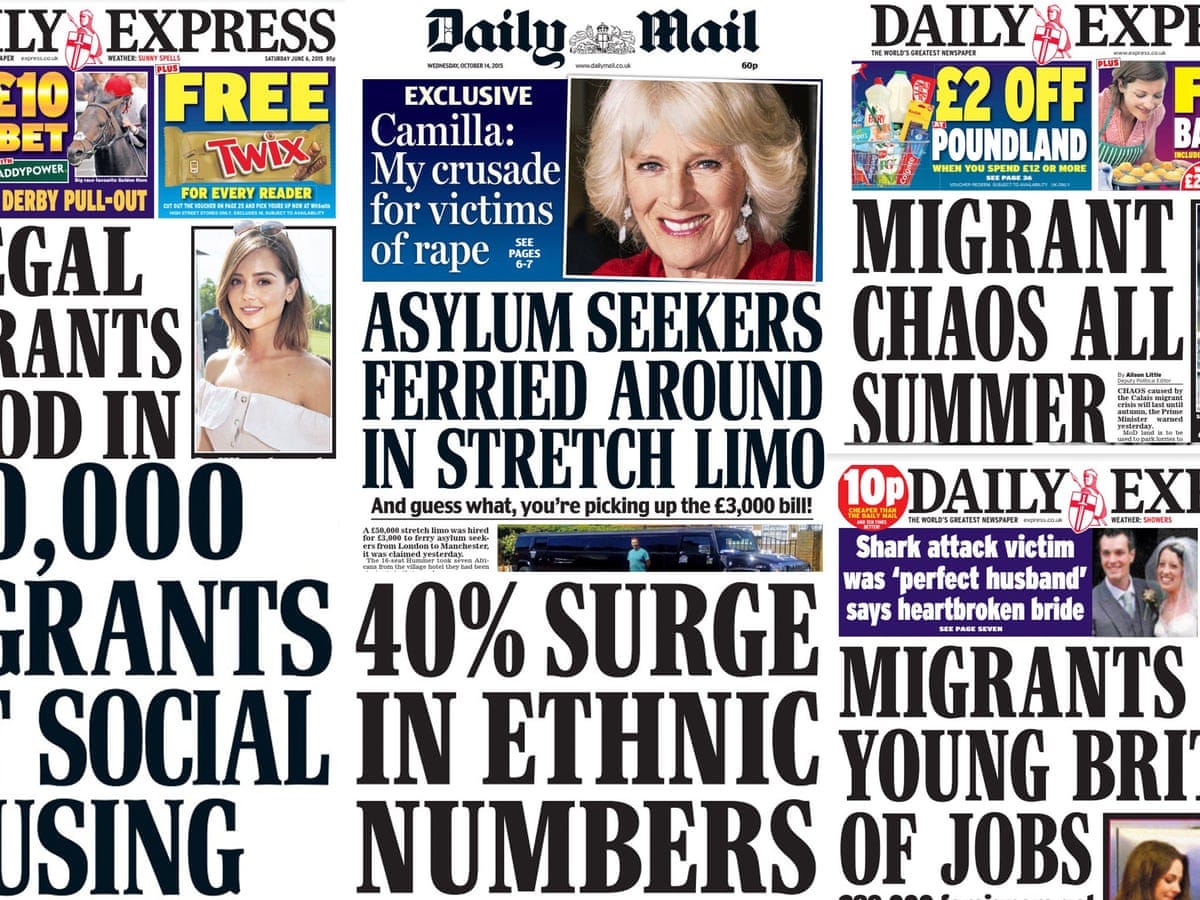






Thank you for this article! This is fascinating timing as I’m literally writing an article about power imbalances, violence, and selective Western morality from the perspective of being Lebanese. I also touch upon some 2006 war memories and other collective Lebanese/Arab trauma. Like you, I have predominantly “Western” features, a Western name, and have also rejected my Lebanese identity because of the anti-Arab sentiments in the West. People rarely guess that I’m middle eastern which makes things emotionally complicated. It’s so refreshing to see another Lebanese person writing about these topics.
Thank you so much for this! And when people think that Hollywood or any American or Western artistic portrayal of Arabs does not matter or is not propaganda, it truly upsets me. These portrayals have become so deeply embedded within the average Western mind that Palestinians continue to be dehumanized and blamed for their own suffering and genocide.